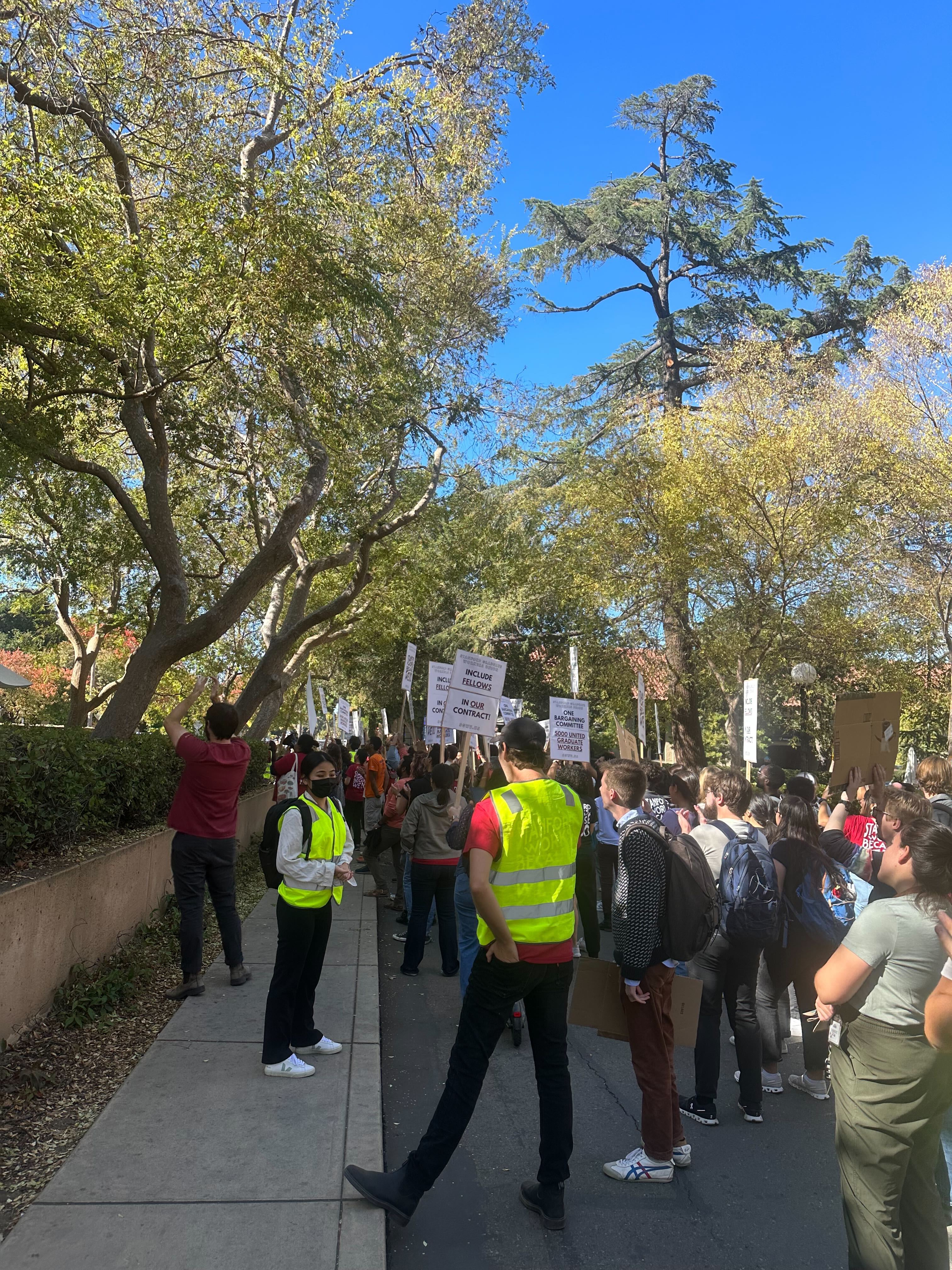Stanford Graduate Workers Union (SGWU) rallied in White Plaza on Nov. 2 to celebrate the beginning of its bargaining process with the University — and to call for the inclusion of fellows into the union.
A counter-protest occurred to condemn the SGWU’s recent ratification of a “Palestine Trade Union Solidarity Statement.”
SGWU is the formal platform from which graduate workers can engage in collective bargaining with Stanford. For months, the SGWU worked on developing a bargaining platform to advocate for better working conditions. On Nov. 2, the language contract proposals were ratified with a sweeping 96% approval.
“We’re going to chant to send a message to Stanford that we are united, that we support our bargaining committee and we are ready for a fair contract, which includes fellows,” said fifth-year applied physics Ph.D. candidate Chris Gustin.
During the rally, SGWU speakers highlighted current problems that graduate workers face, including late payments, discriminatory acts that go unpunished and insubstantial payments, among others. SGWU organizers claimed that the newly ratified bargaining platform will fight against all these issues.
“Our contract will allow us to enforce its terms and hold those who violate them accountable,” said Chloé Brault, a seventh-year Ph.D. candidate in comparative literature.
For the SGWU, a top priority of the rally was to advocate for fellows’ inclusion in the union.
“Stanford has indicated previously that it does not consider graduate workers on fellowship to be workers or to be employees. And we strongly disagree … without us, Stanford loses its primary currency,” said Tania Flores, a fifth-year Ph.D. candidate in Iberian and Latin American cultures.
As fellows and organizers delivered speeches, counter-protesters in the back of the crowd occasionally shouted various slogans such as “Resign, resign, your union is a hate crime.” Over a dozen held signs in protest, one read “democracy or revolt.”
After concluding speeches, SGWU members walked to Tresidder Memorial Union, where their elected bargaining committee engaged in negotiations with University administration on the second floor. SGWU members carried signs in support and chanted “Stanford works because we do.” Some read “One bargaining committee, 5000 united graduate workers.”
The rally “was energizing. Hundreds of SGWU members showed up and showed that they’re ready to fight for a strong contract for the inclusion of fellows,” said Flores, who is the lead SGWU organizer for the division of literatures, cultures and languages.
The counter-protesters criticized the emphasis on unity. According to a representative, their frustration comes because SGWU ratified a Palestine Trade Union Solidarity Statement with about 65% of card-signing members approval.
The Nov. 2 statement reads, “SGWU stands against the illegal occupation of Palestine, the mass ethnic cleansing of Palestinian people and the apartheid system under which Palestinian people live, and we urge our employer to do the same.”
In a flier for the counter-protest, the group wrote that the SGWU’s statement on Palestine “demonizes the State of Israel and calls on the University to divest from Israeli-affiliated companies.”
The spokesperson of the counter-protester group, a Ph.D. candidate who requested anonymity due to fear of retaliation, believes that this issue will impact the future negotiation process.
The SGWU’s “discriminatory acts outshadow [its] bargaining platform … I believe the larger matter is that the University is now aware that many students do not fully support the actions of the SGWU and its discriminatory policies,” they wrote in a statement to The Daily.
Counter-protesters hoped to “ensure that SGWU never again oversteps its bounds as a labor union and puts politics before people,” the spokesperson wrote.
Flores said the counter-protesters do not damage the SGWU’s unity.
“65% of our membership voted in favor of the statement in solidarity with Palestinian trade unions, expressing a clear commitment to the labor movement’s long tradition of international solidarity, and 96% of our members also voted to ratify our bargaining platform,” Flores said. “I think it’s very clear that we are not divided.”
The SGWU shared bargaining updates since its first bargaining session on Friday, where it presented its non-economic bargaining platform based on expanding worker benefits, establishing the union’s long term power and winning a grievance procedure to allow SGWU to enforce a contract more effectively. In response, Stanford’s bargaining team has proposed University Academic and Management Rights.
Stanford’s proposal “constitutes an attempt to retain complete control over virtually every aspect of our employment,” Flores said.
According to Flores, Stanford has done more to show that it is not in favor of the union’s creation. During Friday’s bargaining session, the University insisted on calling graduates “employees” rather than workers and indicated that they are unwilling to include issues of discrimination as grievable issues, Flores said.
University spokesperson Dee Mostofi wrote, “We are committed to bargaining in good faith with the union, and we are focused on having a productive set of negotiations.”
As the SGWU continues in its bargaining process, it plans to engage a wider sect of graduate students.
“This is a really, really exciting time in the history of SGWU … Graduate workers really have the opportunity to help shape the union,” Flores said. “We hope that as many graduate workers as possible will participate in the decision making that lies ahead.”
